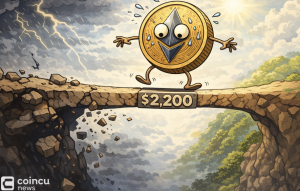Ethereum ETF Applications: Is There Potential For New Breakthrough?
Following the groundbreaking approval by the SEC of 11 spot Bitcoin ETFs on January 10, attention now turns to the potential approval of spot Ethereum ETFs in 2024. Notable contenders leading the charge in Ethereum ETF applications include VanEck, BlackRock, and ARK Invest, underscoring the Escalating interest from major financial institutions in cryptocurrency-based investment products. Let’s take a look at the companies participating in this race with Coincu.
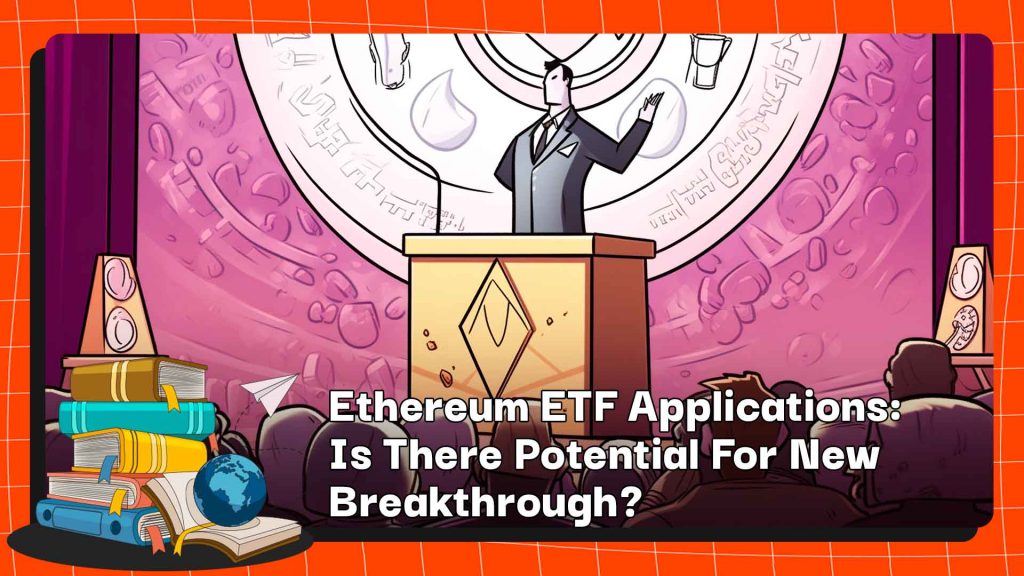
Overview of spot Ethereum ETF
What is a spot Ethereum ETF?
Functioning akin to traditional ETFs, spot Ethereum ETFs are managed by institutions that commit to purchasing and holding Ethereum (ETH) in their reserves.
These ETFs are subsequently listed on conventional stock exchanges, where they issue shares representing ownership of the ETF. Traders can then gain exposure to the real-time price movements of Ethereum through trading these shares, as they reflect the value of the ETH held by the institution.

It’s essential to understand that while owning shares of a spot Ethereum ETF provides exposure to the ETF’s underlying ETH reserves, it does not equate to direct ownership of individual ETH tokens. Shareholders hold claims on the value of the ETH holdings rather than the cryptocurrency itself.
Moreover, institutions managing the ETF may employ various strategies with the underlying ETH, such as lending it out or engaging in staking activities, in a bid to potentially enhance returns for the ETF.
Read more: What Is A Spot Ethereum ETF? How Important Is The New Ether ETF?
How Does a Spot Ethereum ETF Work?
A spot Ethereum ETF operates as a pool where traders contribute funds to purchase Ethereum directly. Unlike futures-based ETFs, which track Ethereum’s price using derivatives like ETH futures, spot Ethereum ETFs hold the actual Ether coins to mirror the cryptocurrency’s price movements. Here’s how it works:
Spot Ethereum ETF buying structure
When investors buy shares of a spot Ethereum ETF, their funds are pooled together to acquire Ethereum coins. The value of the ETF shares then correlates with the price of Ether. If the price of Ethereum increases, the value of the ETF shares rises proportionally, and conversely, if the price of Ethereum decreases, the value of the ETF shares declines.
Behind the scenes, the ETF manager plays a crucial role in ensuring that the ETF accurately reflects the real-time market value of Ethereum. To maintain alignment with Ethereum’s price fluctuations, the manager may engage in activities such as creating and redeeming units, which involve exchanging large blocks of ETF shares for the underlying Ether or vice versa.
Exposure to ETH price
Despite the manager’s efforts to keep the ETF’s value in line with Ethereum’s price, slight disparities may occur due to factors such as trading costs and the frequency of rebalancing. Nonetheless, the goal of a spot Ethereum ETF is to provide investors with a convenient and transparent means of gaining exposure to Ethereum’s price movements without the complexities associated with directly owning and managing the cryptocurrency.
Read more: Ethereum Dencun: Important Update Enhances Network Stability
Benefits of spot Ethereum ETF
Ethereum ETFs offer several compelling benefits for investors looking to participate in the Ethereum market without the intricacies of directly managing digital assets. Here are some key advantages:
Ethereum ETFs enable investors to tap into the Ethereum market without the need to directly own and manage the cryptocurrency through traditional exchanges. By including Ethereum ETFs in their investment strategy, individuals can spread their risk across multiple assets, potentially mitigating losses if one asset underperforms.
Ethereum ETFs are typically available on public exchanges, making it convenient for investors to buy and sell shares during regular trading hours. Unlike purchasing and managing Ethereum directly, which can involve navigating various cryptocurrency exchanges and wallets, investing in an Ethereum ETF streamlines the process, offering a familiar and straightforward investment avenue.
One of the notable advantages of investing in Ethereum ETFs is the assurance of professional management. With an ETF, investors entrust the oversight and security of their digital assets to seasoned experts who manage the fund on their behalf.
Instead, they can rely on the expertise of ETF managers to navigate the dynamic cryptocurrency market and make informed investment decisions that align with the interests of shareholders.
Storing and securing Ethereum tokens can be a daunting task, requiring knowledge of cybersecurity best practices and constant vigilance against potential threats.
By investing in Ethereum ETFs, individuals can sidestep the risks associated with hosting wallets and safeguarding private keys. Instead, the responsibility for safeguarding digital assets falls on the ETF custodians and managers, who employ robust security measures to protect investors’ holdings.
Read more: Spot Ethereum ETF vs. Ethereum Futures ETF: Which Is The Better Investment?
List of All Companies That Have Applied for Spot Ethereum ETFs
The SEC is in the midst of its second round of reviews for spot Ethereum ETFs. This process involves examining applications from various issuers, with at least eight major players currently awaiting approval.
Among those seeking approval for Ethereum Spot ETFs are industry giants like Fidelity, BlackRock, Invesco with Galaxy, Grayscale, Hashdex, 21 Shares with ARK, VanEck, and Franklin Templeton. Each of these issuers has submitted applications for ETFs tied to Ethereum, highlighting the growing interest in cryptocurrency-based investment products.
Top Ethereum ETF Applications
VanEck
Among the leading Ethereum ETF applications is VanEck, which made headlines as the first to file for an Ethereum ETF spot in September 2023.
BlackRock
Following closely behind is BlackRock, a major player in the financial industry, which submitted its Ethereum ETF application in November of the same year, signaling its interest in entering the Ethereum ETF market.
ARK Invest
Another significant contender is ARK Invest, known for its innovative approach to investment strategies. ARK Invest filed for its Ethereum ETF last September, joining the ranks of institutions seeking approval to offer investors exposure to the burgeoning cryptocurrency market through ETFs.
Other Ethereum ETF Applications
Fidelity
Fidelity, a renowned name in the investment management industry, filed for its Ethereum ETF in November 2023. With its extensive experience and reputation in the financial sector, Fidelity’s entry into the Ethereum ETF market underscores the broadening appeal of cryptocurrencies among traditional investors. The Fidelity Ethereum Fund would be made available to the public on the Cboe BZX Exchange upon approval.
Invesco Galaxy
Another notable Ethereum ETF application is Invesco Galaxy, which submitted its application for an Ethereum ETF in October 2023. Invesco Galaxy’s involvement in the Ethereum ETF space reflects the continued expansion of offerings within the cryptocurrency investment landscape as established players seek to provide investors with diverse opportunities to access digital assets.
Hashdex
In September, the Nasdaq stock exchange submitted a request to list the Hashdex Nasdaq Ethereum ETF with the SEC. Toroso Investments, a member of the National Futures Association and a certified commodity pool operator with the Commodities Futures Trading Commission, oversees and manages the fund.
Grayscale
Grayscale, a prominent cryptocurrency asset management firm, is also seeking approval for its Ethereum ETF after filing its Ethereum ETF application in October 2023. Grayscale’s entry into the Ethereum ETF market further validates the growing institutional interest in cryptocurrencies and demonstrates confidence in the potential of Ethereum as a leading blockchain platform.
Hashdex, a global asset management firm specializing in cryptocurrency investments, filed for its Ethereum ETF in September 2023.
Franklin Templeton
Franklin Templeton has officially entered the competition for Ethereum ETFs, as confirmed in a filing on February 12. With an approval deadline set for November 2024, the asset manager has outlined its strategy, which notably deviates from conventional approaches seen in the industry.
Unlike some competitors, Franklin Templeton’s proposal emphasizes cash creations and redemptions, eschewing the typical in-kind transactions involving direct crypto transfers.
In its filing, Franklin Templeton disclosed its choice of custodians, highlighting Coinbase Custody for cryptocurrency custody and the Bank of New York Mellon for cash custody, administration, and transfer agency services.
Background of Ethereum ETF Applications
VanEck
VanEck, a seasoned player in the financial industry with a focus on mutual funds and ETFs, has been striving to establish a foothold in the cryptocurrency market for several years. While its attempts to launch a bitcoin ETF in the United States have encountered setbacks, the firm has maintained its pursuit of opportunities in the digital asset space.
In 2021, VanEck Europe, an arm of the company responsible for approximately 50 ETFs traded on stock exchanges throughout Europe, introduced the VanEck Crypto and Blockchain Innovators UCITS ETF. This ETF, designed to tap into the potential of the crypto and blockchain sectors, offers exposure to a diversified portfolio that includes prominent companies such as Coinbase Global, Block, Marathon Digital, Bitfarms, and MicroStrategy, alongside other smaller allocations.
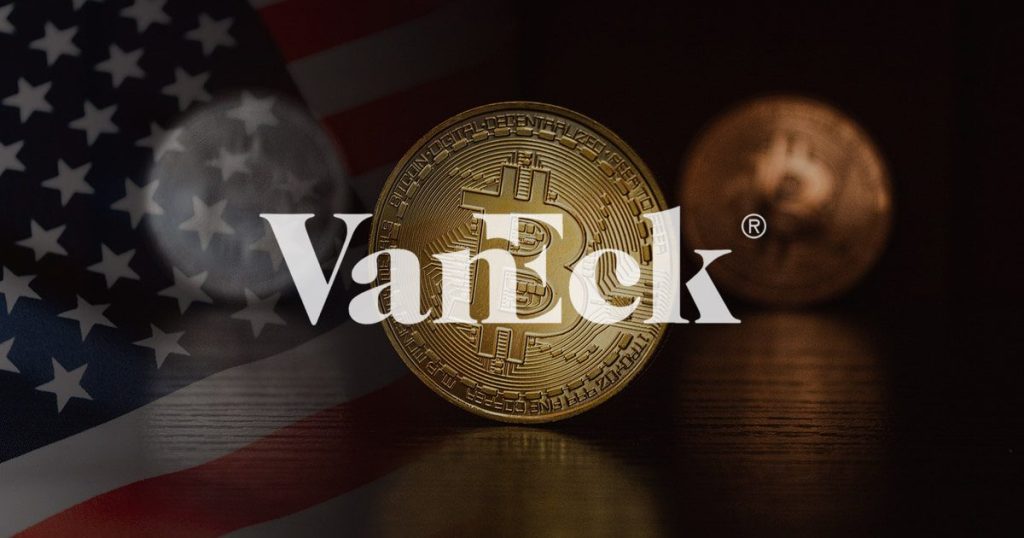
Despite its relative novelty in the market, the VanEck Crypto and Blockchain Innovators UCITS ETF has quickly gained traction among investors. It has emerged as one of the top-performing ETFs within VanEck Europe’s portfolio, ranking among the top 15 by assets under management. The fund’s performance has been marked by considerable volatility, distinguishing it from many other products offered by VanEck Europe.
BlackRock
BlackRock, the globe’s largest asset manager, submitted a proposal for a Bitcoin ETF to the SEC last June. The announcement has injected fresh enthusiasm into the crypto market, leading to a remarkable recovery.
The significance of BlackRock’s venture into the realm of Bitcoin ETFs extends beyond mere market dynamics. It serves as a validation of cryptocurrencies and underscores the broader trend within the global financial ecosystem towards embracing digital assets. The proposal not only reflects growing institutional interest in cryptocurrencies but also suggests a shifting paradigm in how traditional finance views digital currencies as a legitimate asset class.

Earlier this year, the financial behemoth made headlines by launching its inaugural tokenized fund on the Ethereum blockchain. Dubbed the BlackRock USD Institutional Digital Liquidity Fund, or BUIDL, this initiative is fully backed by cash, U.S. Treasury bills, and repurchase agreements. The fund offers investors an opportunity to earn U.S. dollar yields within the crypto space, marking a significant milestone in the convergence of traditional finance and digital assets.
With BlackRock looking forward to its spot Ethereum ETF, this isn’t the first time BlackRock has dipped its toes into the crypto waters.
ARK Invest
ARK Invest and 21Shares have jointly registered a spot Ether ETF. This innovative fund has commenced trading on the Cboe BZX Exchange, leveraging the CME CF Ether-Dollar Reference Rate – New York Variant.
ARK always expects a “power law distribution” within the cryptocurrency market. This theory posits that a select few cryptocurrencies will emerge to dominate the majority of value and market share—a concept that could reshape investment strategies in the digital asset realm.
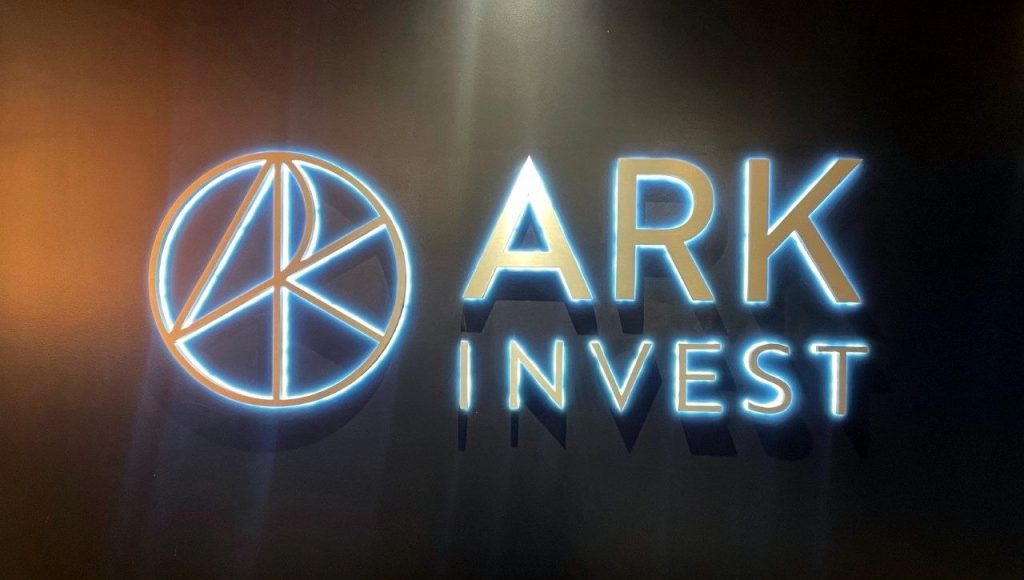
The registration of the spot Ether ETF marks a significant step forward in providing investors with regulated exposure to Ethereum, the second-largest cryptocurrency by market capitalization. The ETF is sponsored by 21Shares, with Delaware Trust Company serving as the trustee and Coinbase Custody Trust Company acting as the custodian.
Fidelity
As interest in cryptocurrency began to rise in the mid-2010s, Fidelity recognized the need to adapt to evolving investor preferences.
In response to the growing interest in cryptocurrency among investors, Fidelity, one of the largest asset managers and brokerages in the U.S., made a significant move into the digital currency space in mid-October 2018. The company launched Fidelity Digital Assets, a limited liability corporation aimed at serving institutional customers seeking exposure to the burgeoning cryptocurrency market.

Fidelity Digital Assets offers a range of services tailored to institutional clients, including offline cold storage custody solutions and trade execution. Leveraging its position as a major financial services firm, Fidelity aims to provide comprehensive digital asset investment solutions to financial institutions.
Recognizing the potential of blockchain technology in the financial sector, Fidelity further expanded its commitment to cryptocurrency by tasking the Blockchain Incubator section of its research and development team, known as the Fidelity Center for Applied Technology (FCAT), with exploring cryptocurrency investing solutions for institutional investors.
Invesco Galaxy
Galaxy Asset Management, a prominent player in the global digital assets investment landscape, boasts an impressive $5.3 billion in assets under management (AUM). The firm stands out for its commitment to providing investors with institutional-grade access to the dynamic digital assets ecosystem. Offering a diverse suite of over a dozen investment vehicles, Galaxy caters to a wide range of investment preferences, including passive, active, and venture strategies.

Invesco Ltd., on the other hand, is an established American independent investment management company headquartered in Atlanta, Georgia. With branch offices spanning across 20 countries, Invesco has cemented its position as a key player in the financial services sector. Notably, its common stock is a constituent of the S&P 500 index and is actively traded on the New York Stock Exchange (NYSE).
Galaxy in partnership with Invesco to launch the Invesco Galaxy Bitcoin ETF (BTCO) in January. With their eyes on the crypto industry, they went ahead with the spot Ethereum ETF.
Hashdex
Hashdex has been carving pathways to prosperity since its establishment in 2018. With a mission to democratize access to the crypto ecosystem worldwide, Hashdex has garnered trust from investors, overseeing a substantial $849 million in client assets. These funds not only empower innovative investors but also facilitate their entry into the burgeoning crypto economy.
Among its notable ventures, Hashdex Group played a pivotal role in co-creating the Nasdaq Crypto Index (NCI), aimed at furnishing global investors with a dependable benchmark for the ever-evolving crypto asset class. In a landmark move in 2021, the group introduced the Hashdex Nasdaq Crypto Index ETF (HNCI), marking the inception of the world’s premier crypto index ETF.

Managing the fund assets for the Bitcoin Futures ETF is Tidal Investments LLC, an entity entrusted with the responsibility of navigating the intricate landscape of crypto investments. With a steadfast dedication to bridging the gap between traditional finance and the crypto space, Hashdex continues to spearhead initiatives that pave the way for the mainstream adoption of digital assets.
Grayscale
Founded in 2013, Grayscale made its mark by launching a Bitcoin trust in the same year, marking its entry into the digital currency investment realm. In 2015, the company became a subsidiary of Digital Currency Group, consolidating its position in the market.
Notably, Grayscale Bitcoin Trust made history in 2015 by becoming the first publicly traded Bitcoin fund in the United States, trading over-the-counter on the OTCQX market. However, Grayscale’s fee structure, although higher than average compared to similar exchange-traded funds (ETFs), was justified by the company as necessary to cover the costs of trading Bitcoin.
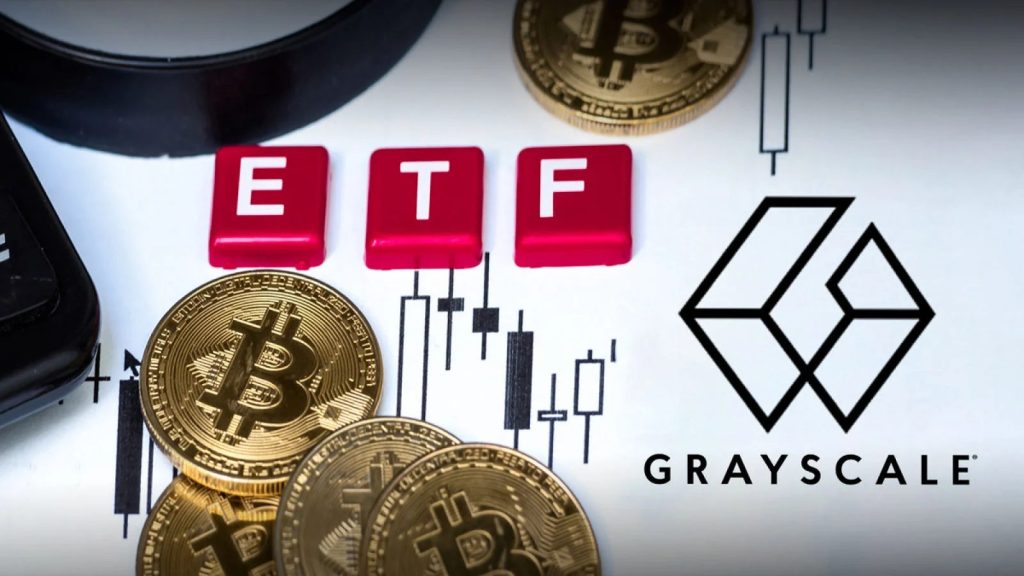
Despite its pioneering efforts, Grayscale faced setbacks in its ambition to transition its Bitcoin Trust (GBTC) into an ETF. The company’s application in 2017 was met with negative feedback from the SEC, leading to a voluntary withdrawal. Nonetheless, perseverance paid off as Grayscale successfully completed the transformation after seven years.
Now, with its focus on Ethereum, Grayscale aims to capitalize on the growing interest in the cryptocurrency market. By pivoting towards spot ETFs for its Ethereum trust, Grayscale seeks to offer investors diversified opportunities to engage with digital assets in a regulated framework.
Franklin Templeton
Franklin Templeton, a stalwart in traditional finance circles, has taken a significant stride into the world of cryptocurrency, signaling a profound shift in the industry’s landscape. With a rich history spanning 77 years, the company boasts a staggering $1.5 trillion in assets under management, solidifying its position as a heavyweight in the asset management sector.
This embrace of crypto represents a departure from the traditional for Franklin Templeton, earning it the moniker of being “TradFi” incarnate. Earlier this year, the company made waves by launching the Franklin Bitcoin ETF (EZBC), joining the ranks of just ten spot Bitcoin ETFs presently listed in the United States.

In a bold display of its commitment to the crypto movement, Franklin Templeton adorned its iconic Ben Franklin logo with laser eyes, a symbol widely associated with fervent support for Bitcoin and the broader cryptocurrency ecosystem.
Franklin Templeton has also set its sights on expanding its ETF portfolio to include Ether. Alongside several other firms, Franklin Templeton has submitted spot Ethereum ETF proposals to the SEC, signaling its intent to capitalize on the growing demand for exposure to digital assets beyond Bitcoin.
Challenges of Ethereum ETF Applications
Industry experts express doubts regarding the likelihood of approvals arriving in May, as initially scheduled, for various reasons. Foremost among these concerns is the current state of Ether, the native cryptocurrency of the Ethereum blockchain, which is undergoing a process called staking. Staking involves cryptocurrency holders locking up their funds as collateral to support the network’s operations, in return for rewards in the form of additional cryptocurrency.
The potential classification of Ether as a security by the SEC) looms large, with significant implications not only for the token itself but also for the broader cryptocurrency markets. Should the SEC deem Ether security, it would necessitate compliance with securities laws, granting the SEC enhanced authority to regulate its trading and usage. Additionally, such a classification could pave the way for other cryptocurrencies to be labeled as securities, subjecting them to heightened regulatory scrutiny.
The prolonged delays in the SEC’s evaluation process have led industry experts to question the agency’s motives, drawing parallels with its historical approach in rejecting numerous Bitcoin (BTC) applications over the past decade. Consequently, the initial optimism surrounding Ethereum ETF applications has waned in recent weeks despite earlier forecasts predicting the approval of all filings by May 2024.
In light of the latest postponements by the SEC, analysts are now speculating that the regulatory body intends to reject all spot Ethereum ETF applications slated for review in May. This development marks a shift in sentiment within the industry, prompting stakeholders to reassess their expectations regarding the approval of Ethereum-based investment products.
Could There Be A Bright Future For Ethereum ETF Applications?
The SEC, notorious for its numerous delays in greenlighting spot Bitcoin ETFs, finds itself in a comparable predicament with spot Ethereum ETFs. Presently, the regulatory body is tasked with evaluating eight Ethereum ETF applications, each with distinct deadlines, awaiting their verdict.
The SEC’s current deadline to either approve or deny these spot Ethereum ETFs is set for the conclusion of May 2024. However, the SEC has extended its deadline for making a decision on the spot Ethereum ETF applications put forth by BlackRock and Fidelity. This extension stems partly from the SEC’s request for public input regarding the Fidelity and BlackRock ETF applications. Specifically, the SEC is soliciting public commentary on whether the proposed spot Ethereum ETFs might introduce vulnerabilities to market manipulation.

During the approval process for spot Bitcoin ETFs, certain applicants took the initiative to submit revised documents to the SEC, aiming to integrate insights gleaned from the public comment period. Eventually, the SEC granted approval to those applications. Should spot Ethereum ETF applicants follow suit and update their submissions to assimilate feedback, it could signal a positive indication that the SEC might incline towards approving their applications.
Conclusion
Recent developments have fueled speculation and skepticism alike. Many wonder whether the SEC will follow its precedent set with Bitcoin and approve Ethereum ETFs, or if a different stance will emerge. The approval of the Bitcoin ETF served as a significant milestone, marking the first time a cryptocurrency-based ETF gained regulatory approval in the United States. However, Ethereum’s case presents its own unique set of considerations.
The SEC’s decision regarding spot Ethereum ETFs carries profound implications for the broader market. Approval could signal growing acceptance and integration of cryptocurrencies within traditional financial systems. Conversely, a denial might dampen enthusiasm and prompt a reevaluation of the regulatory hurdles facing crypto-based financial products.
| DISCLAIMER: The information on this website is provided as general market commentary and does not constitute investment advice. We encourage you to do your own research before investing. |










